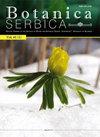酵母提取物可激活拟南芥GTS1转录本
IF 1.1
4区 生物学
Q4 PLANT SCIENCES
引用次数: 0
摘要
WD40重复序列蛋白参与dna -蛋白和蛋白-蛋白相互作用,积极调节植物的胁迫反应。GTS1被称为WD40重复蛋白,是一种支架蛋白,在核糖体生物发生和生物量积累中起重要作用。在本研究中,我们研究了拟南芥中GIGANTUS1 (GTS1)基因表达对生物和非生物胁迫因子的响应。此外,我们培养并鉴定了拟南芥gts1突变体(T-DNA SALK_010647),以观察其缺失对植物的影响。结果表明,100-200 mM ABA和100-200 mM NaCl处理均未引起GTS1基因表达的变化,而1 g/l和2 g/l酵母浸膏(YE)处理仅6 h对GTS1基因表达产生负向影响。经叶处理10和30 d后,GTS1基因表达上调,植株生长效率降低。因此,我们得出结论,通过下调GTS1转录本,我们可以获得更好的生长和/或更高的生物量,这似乎是农业招聘的一个很好的选择。本文章由计算机程序翻译,如有差异,请以英文原文为准。
Arabidopsis thaliana GTS1 transcripts are activated by yeast extract
WD40 repeat-containing proteins participate in DNA-protein and protein-protein interactions and positively regulate plant stress responses. GTS1, known as a WD40 repeat-containing protein, works as a scaffold protein and is important in ribosome biogenesis and also biomass accumulation. In this study, we evaluated the GIGANTUS1 (GTS1) gene expression in response to biotic and abiotic stress factors in Arabidopsis thaliana plants. In addition, we grew and characterized A. thaliana gts1 mutant (T-DNA SALK_010647) in order to observe the effects of its absence on plants. According to our results, 100-200 mM abscisic acid (ABA) and 100-200 mM sodium chloride (NaCl) treatment did not cause any changes in GTS1 gene expression, while only 6 h of 1 g/l and 2 g/l yeast extract (YE) treatment negatively affected GTS1 expression in 10-day-old plant explants. After 10 and 30 days of YE treatment, GTS1 gene expression was upregulated, and as a consequence plant growth efficiency was reduced. We thus concluded that through the downregulation of GTS1 transcripts, we could obtain better growth and/or higher biomass, which seems to be a good option for agricultural recruitments.
求助全文
通过发布文献求助,成功后即可免费获取论文全文。
去求助
来源期刊

Botanica Serbica
Agricultural and Biological Sciences-Plant Science
CiteScore
1.40
自引率
12.50%
发文量
17
审稿时长
34 weeks
期刊介绍:
Botanica Serbica publishes original research papers on all aspects of plant, fungal and microbial biology research including the disciplines of microbiology, mycology, lichenology, bryology, flora, vegetation, biogeography, systematics, taxonomy, plant biotechnology, plant cell biology, plant ecology, environmental plant biology, forestry, genomics, horticulture, limnology, metabolomics, molecular biology, proteomics, virology, plant conservation and protection, and wildlife and ecosystem management.
 求助内容:
求助内容: 应助结果提醒方式:
应助结果提醒方式:


